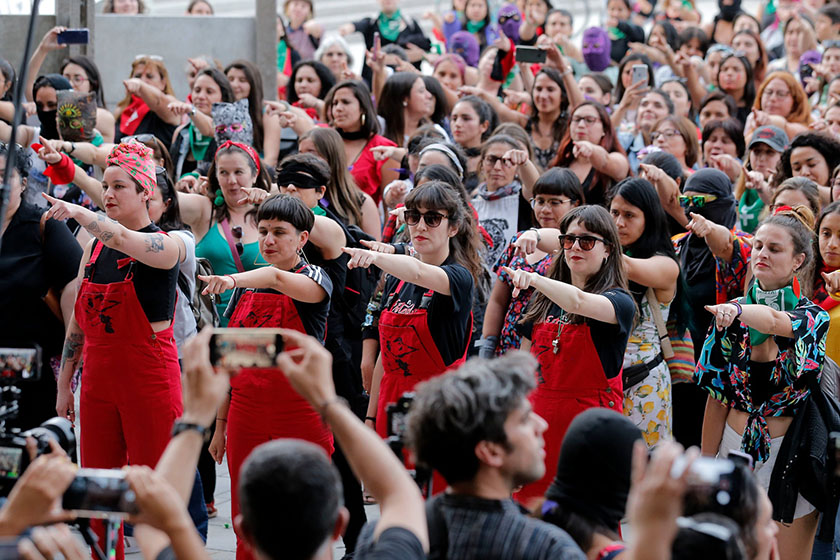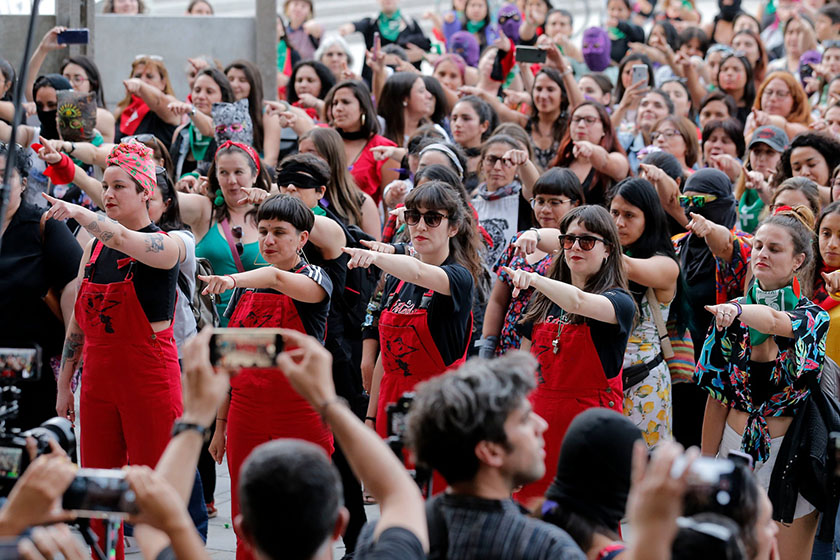¡El Arte no Calla! – Episode 4 of our new podcast in Spanish

“¡El Arte no Calla!,” a monthly Spanish-language podcast of the Artists at Risk Connection (ARC), explores art, freedom of expression, and human rights in Latin America. In each episode, ARC’s Latin America Representative Alessandro Zagato invites a different guest to help analyze the varying states of artistic freedom in Latin America and the violations that artists and activists are suffering in the region.
Episode 4: LASTESIS Speaks! Feminist Art, Judicial Attacks, and Censorship in the Chilean Lockdown
In our fourth episode, ARC sat down with Dafne, Paula, Lea, and Sibila, the four members of Chilean art collective LASTESIS. The group reached worldwide fame for its performance “A rapist on your path” (“Un violador en tu camino”), a song that denounces patriarchy and structural gender violence. We spoke about lawsuits that have been filed against them by the police in a direct attack on “A rapist on your path” and another video-performance that the group recently recorded in collaboration with Russian collective Pussy Riot. In the interview, LASTESIS also provided insights on the situation of freedom of expression in Chile and the role that art can play in processes of liberation and democratization.
AZ: Where are we at with the lawsuit and the accusations that have been filed against you?
LT: Recently we were given access to the lawsuits. There are two, one was filed in May, the other in June. There are two female lawyers who are helping and guiding us through this process, which is quite slow and makes us wait. However, a support campaign is being set up with different organizations from Chile and abroad advocating for us and putting pressure on the prosecutor’s office and the Chilean government, which is openly supporting the accusations. Our goal is to stop the lawsuit from proceeding in its processes of formalization, so that we do not need to go on trial and declare – but there have been no particular developments so far.
AZ: It is good to know that a solidarity movement is growing internationally. Could you please give us some background about the case – what happened, and what do the authorities want from you?
LT: The case has to do with a video that we did with the Russian collective Pussy Riot. It is a video performance denouncing police violence and brutality in Latin America. We received the invitation from a member of Pussy Riot in Russia and we developed the video with a representative of the collective in Mexico. Together with her, we drafted and recorded this manifesto-declaration against the carabineros, where we stand in front of their station in Valparaiso, our town. It was a completely pacific act, and of an artistic nature. After the video was published, the police filed a first lawsuit accusing us of inciting violence against their institution. The prosecutor’s office asked them for prior actions. Therefore, they did an investigation and they made the decision to file a second lawsuit where they consider a previous intervention called “A rapist on your path” (“Un violador en tu camino”) that became viral and was reproduced in more than forty countries. They are also attempting to make us guilty of things that happened even before people knew who we were. These harassments are absurd, but they demonstrate that institutional violence is present all the time and that the government and the law support it, which puts us in a situation of extreme vulnerability.
m-block-quote “>
“The government took advantage of this lockdown situation to discard the demands that came from the streets by censoring artistic expression.”
AZ: We have seen that alongside the social protests that started in Chile last year there was an upsurge of social creativity and artistic manifestations on the streets, which played a very important role in that movement. What is the situation of freedom of expression like in Chile now?
LT: Today, the majority of the country is on lockdown, with curfew imposed since March. Every type of street expression and manifestation is banned and prevented by the police and the army. There were some protests in areas that are more vulnerable. They had to do with poverty, hunger, and so on – against a government that took action very late. However, due to the lockdown, these are never protests that reach the levels witnessed in October or November. What people can do now is to use virtual platforms, even though there is strong censorship. What happened to us is an attack on freedom of expression, considering the fact that the video is an artistic work of denunciation. Although they did not actually forbid the circulation of the video and they did not intervene on our social networks, we received threats and harassments because of this work. The same happened to Delight Lab, a collective that has projected messages on the Telefonica tower in Santiago. They were censored when they projected the word “hambre” (hunger) [onto the building]. The case highlighted the criteria under which power operates. In our case, our work is affected because now we have to always think and consider if something we produce can be published or not – so freedom of expression is now curtailed in Chile.
AZ: Do you think that now, with the gradual return to normality as announced by the government, there will also be a return to demonstrations in the streets? How do you imagine the coming months in Chile?
LT: It will be complicated. Evidently, we are experiencing a health crisis that is affecting the entire world. However, the government took advantage of this lockdown situation to discard the demands that came from the streets by censoring artistic expressions, repressing people who were protesting for food, and so on. This crisis highlighted even more the structural crisis shaping the country, which comes from many years ago – a social crisis, and a crisis of representation. As soon as people will be able to take the streets, they will do so because the situation has become unbearable.
m-block-quote “>
“These harassments are absurd, but they demonstrate that institutional violence is present all the time and that the government and the law support it, which puts us in a situation of extreme vulnerability.”






